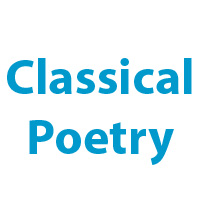What is Classical Poetry?
The term classic has an array of meaning. It may be applied to works from the ancient Graeco-Roman tradition or those written in imitation of it. Classical has also had a number of meanings over the centuries. Its root is the Latin word classicus, referring to a person or thing of the first rank.

Classical or classic literature first referred to works written for the nobility and upper class audience. Over time, however, this term came to signify any Greek or Roman works deemed particularly worthy and subsequently Graeco-Roman writing in general. Classical can also be used to describe works that exhibit the qualities or characteristics of classicism, a complex set of attitudes and standards that classicists, scholars of Graeco-Roman antiquity, believe to be reflected in the art, architecture, history, philosophy, politics, and literature of ancient Greece and Rome. Classicists believe that the ancients achieved a standard of excellence that has seldom been surpassed by more modern writers; as a result, the term classical carries the positive connotations of “excellence” and “achievement.”
We use the terms ‘classicism’ and ‘neo-classicism’ even in common parlance today. It may sound surprising that even a hundred years ago, the neo-classical writers did not characterize themselves as classicists at all. The eighteenth century was called The Augustan Age. As late as 1828, Macaulay called the neo-classical age “the critical school of poetry.”
Published on 23 Jan. 2014 by Kedar Nath Sharma
Related Topics
 |
bachelorandmaster.com |